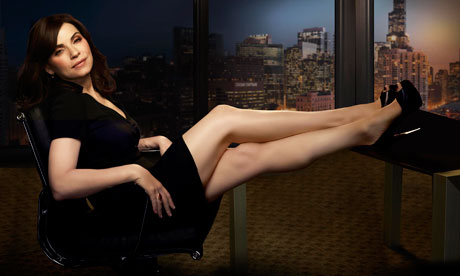
To everything there is a season – and in some cases seven. I have measured my life in the span of TV series, from LA Law to Star Trek: Voyager through to Buffy and Law and Order: Special Victims Unit. They aren't necessarily the finest television – indeed "better" shows, such as Battlestar Galactica or The Killing, come along and absolutely captivate – but these reliable, week-in, week-out favourites refuse to be dislodged from our viewing habits. They remain the comfy, familiar jumper to the cashmere sweater (or, in The Killing's case, Faroe knit) of the more lauded shows. They are my comfort viewing.
When the world has been a bit rubbish – whether you've had a crap day at work or an atomic argument with your boyfriend – nothing compares to nestling on the sofa with a packet of Jaffa Cakes and a dose of The Closer's Brenda Leigh Johnson. (OK, so it is usually two packets of Jaffa Cakes.)
So what's to be done when your favourite bit of comfort viewing ends? When The Closer finished, I was hoping that Major Crimes, the show's spin-off, might fulfil the same purpose. But sadly there's neither hide nor hair of it on E4. Revenge, on the same channel, might be brilliant, but it doesn't quite hit the mark here – it's too focused on the series story arc to provide the texture required for genuine comfort viewing. Similarly, I love American Horror Story and Nurse Jackie, but the first is too WTF? Grand Guignol to be truly comforting, and the second too honest and raw to provide any sort of solace when you find yourself emotionally fragile. (Law & Order: SVU, on the other hand, oddly does, but that's between me and my therapist.)
Some might say there's no need to look westward for comfort viewing when there are homegrown efforts which qualify as such. Sunday nights have long been the home of UK dramas designed to soothe – from Lark Rise to Candleford and Wild at Heart to Downton Abbey and Call the Midwife. To this, I'd respond that a) I'm not a pensioner just yet; b) period dramas and cheetah cubs have never offered me much comfort; and c) for my tastes, Americans do it better – and, crucially, in much greater volume.
There is greater comfort in knowing that the series in which you are wrapping yourself stretches to 13 or 22 episodes, not a meagre six or eight. (For those who do regard Call the Midwife as comfort viewing, by the way, the soundtrack is being released next month. Presumably it consists of the howls of impoverished women in labour, the squeals of urchins running on cobbles and brisk demands for hot water and towels.)
So it is to welcome arms indeed that The Good Wife (More4) returns at the end of the month. Set in the most aspirational law firm since McKenzie, Brackman, Chaney and Kuzak, The Good Wife is complicated but somehow cosy. This is of course glossy cosiness; as glossy as Alicia Florrick's (Julianna Margulies) tresses. With her troubled relationship with once-errant husband Peter on more of a backburner than ever – to such an extent that the title becomes merely a moniker and not an indication of what the show is actually about – other relationships come to the fore.
Noises from US about the new season make me nervous about the arrival of Kalinda's estranged hubby, played by Marc Warren – not least because Kalinda's captivating nature is her hard-nosed invulnerability, which could be dangerously dented by too much backstory. So let's hope he doesn't linger too long. There's enough emotion amid the legal procedural from Alicia and Will without Kalinda getting all dewy-eyed.
While you might dismiss the drama as polished US tosh, it's very good polished tosh – especially if the calibre of guest star is anything to go by. Last series saw Matthew Perry, Parker Posey, Amy Sedaris and Michael J Fox grace The Good Wife, while this season promises stints from ER's Maura Tierney, Nathan Lane and Amanda Peet. The Good Wife may be as sharp as the suits worn by its resident shark Eli Gold (played exquisitely by our own Alan Cumming), but it's nevertheless 13-tog comfort viewing.







